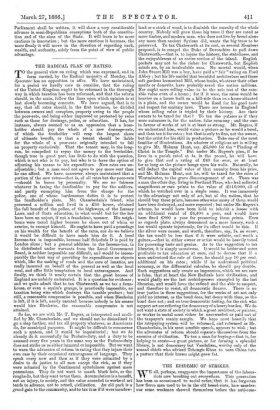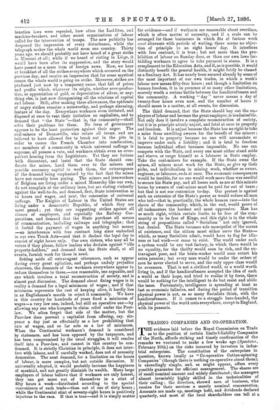THE EPIDEMIC OF STRIKES.
Iv( rt. all, perhaps, exaggeratelhe importance of the labour- yv riots now breaking .out everywhere. This generation has been so-accustomed to -social order,' that it has forgotten how-fierce men-used-to hr the-old bread-riets, how murder- ous some workmen showed themselves' before the anti-cem- bination laws were repealed, how often the Luddites, and machine-breakers, and other secret organisations of labour called for the intervention of troops. The new publicity has deepened the impression of every disturbance, while the telegraph makes the whole world seem one country. Thirty years ago, we should probably not have heard of a great strike in Missouri at all ; while if we heard of rioting in Liege, it would have been after its suppression, and the story would have passed as a mere item of foreign news. Now, we hear at breakfast of all the strikes everywhere which occurred on the previous day, and receive an impression that for some mystical reason the whole world is going on strike. Moreover, strikes are produced just now by a temporary cause, that fall of prices and profits which, whatever its origin, whether over-produc- tion, or appreciation of gold, or depreciation of silver, or any- thing else, is just now disorganising all the relations of capital and labour. Still, after making these allowances, the epidemic of angry strikes remains a noteworthy, and perhaps alarming, feature of the day. Everywhere workmen seem irritated, and disposed at once to vent their irritation on capitalists, and to demand that the State "—that is, the community—shall solve their problems for them. No form of government appears to be the least protection against their anger. The coal-miners of Decazeville, who refuse all terms, and are believed to have allowed fire to break out in the pits in order to coerce the French Chamber into confiscation, are members of a community in which universal suffrage is supreme, all possess a vote, and workmen obtain even an over- patient hearing from the Legislature. Yet they are furious with discontent, and insist that the State should con- fiscate the mines, hand them over to the miners, and provide necessary capital to work them, the extravagance of the demand being emphasised by the fact that the mines have not recently been paying. The miners and ironworkers of Belgium are living under a mixed Monarchy like our own, do not complain of the ordinary laws, but are rioting violently against the well-to-do, and demand, first, State intervention as to hours and wages, and next, the concession of universal suffrage. The Knights of Labour in the United States are living under a democratic Republic, of which they are most proud ; yet they are supporting strikes against all classes of employers, and especially the Railway Cor- porations, and demand that the State purchase all means of communication, including railways and telegraphs ; that it forbid the payment of wages in anything but money —an interference with free contract long since embodied in our own Truck Acts—and that it declare the legal day to consist of eight hours only. Our own rioters, who may all be voters if they please, follow leaders who declaim against "idle property-holders," and demand that the State shall, at all events, furnish work for those in need.
Setting aside all extravagant utterances, such as appear during every great agitation, and perhaps unduly prejudice observers, the demands of the workmen everywhere appear to reduce themselves to three,—one reasonable, one arguable, and one which involves a total reconstruction of society, and is almost past discussion. The demand about fixing wages is in reality a demand for a legal minimum of wages ; and if that minimum represents the cost of keeping alive, it hardly lies in an Englishman's mouth to reject it summarily. We have in this country for hundreds of years fixed a minimum of wages—a very low one, indeed, but still an operative one—by allowing any one who hungers to claim relief under the Poor- law. We often forget that side of the matter, but the Poor-law does prevent a capitalist from offering, say, six- pence a day just as effectually as a law prohibiting that rate of wages, and so far acts as a law of minimum. When the Continental workmen's demand is considered by statesmen, and has been opposed by the taxpayers, and has been compromised by the usual struggles, it will resolve itself into a Poor-law, and cannot in this country be con- demned. It is strictly Christian in principle, it does not inter- fere with labour, and if carefully worked, does not of necessity demoralise. The next demand, for a limitation on the hours of labour, is more complex, but not outside discussion. If universally adopted, it would probably increase the happiness of mankind, and not greatly diminish its wealth. Many large employers of labour believe that if workmen are only honest, they can get more out of themselves in a stint of fifty hours a week—distributed according to the special convenience of each trade—than out of one of sixty hours ; while the Continental stint of seventy-eight hours is positively injurious to the race. If that is true—and it is simply matter for evidence—and if workmen are reasonable about overtime, which is often matter of necessity, and if a scale can be arranged for those businesses in which fits of furious work must alternate with periods of waiting, there seems no objec- tion of principle to an eight hours' day. It interferes with free contract, it is true ; but not more than the pro- hibition of labour on Sunday does, or than our own laws for- bidding workmen to agree to take payment in stores. It is a complement to the Education Acts, and if, as is possible, it would distinctly benefit the general health, it might fairly be classed as a Sanitary Act. It has nearly been secured already by some of the most important of our own trades, in which a week's labour now means fifty-four hours ; and though a limitation on human freedom, it is, in presence of so many other limitations, scarcely worth a serious battle between the handicraftsmen and the community. A working " day " never means a day of twenty-four hours even now, and the number of hours it should mean is a matter, at all events, for discussion.
The third demand, that the State should buy out the em- ployers of labour and become the great employer, is inadmissible. Not only does it involve a complete reconstruction of society, but it is in principle utterly unjust, and fatal at once to property and freedom. It is unjust because the State has no right to take a mine from unwilling owners for the benefit of the miners ; it is fatal to property because no one will accumulate or improve under such a liability ; and it is fatal to freedom because individual effort becomes impossible. No one can compete with the State, and every one must either stand aside and starve, or range himself as a labourer in State employ. Take the coal-miners for example. If the State owns the mines, all miners must work for the State, or give up their picks, and individualism in mining work, whether as owner, engineer, or labourer, ends at once. The economic consequences would be terrible, for no one would work more than was needful to secure his State pay, and all losses such as are at this minute borne by owners of coal-mines must be paid for out of taxes ; but that is not our contention to-day. Our protest is against such an extension of the State's power as would reduce all men who toil—that is, practically, the whole human race—into the slaves of the community, which, in the end, would prove of all taskmasters the hardest and moat oppressive. Man has as much right, within certain limits, to be free of the com- munity as to be free of Kings, and this right is in the whole string of propositions called " Socialism " not only ignored, but denied. The State becomes sole monopolist of the means of existence, and the citizen must either serve the State— which, as many Socialists admit, would have to flog for idle- ness or bad work—or cease to exist. The world under such a system would be one vast factory, in which there would be no equality, for the thrifty would soon be rich, and the ex- travagant poor, and the brain-worker would soon extort his extra pennies ; but every man would be under the orders of men he never elected to serve, and the only upper class would be overseers. That is not a civilised world, or a world worth living in, and if the handicraftsmen accepted the idea of such a world as their hope, and tried to realise it by force, there would be nothing for the intelligent to do but resist and abide the issue. Fortunately, intelligence is spreading at least as fast as economic fallacies, and during the period of transition physical power is not, as so many Socialists think, with the handicraftsmen. If it comes to a struggle bare-handed, the physical power of the world rests everywhere, except in England, with its peasants.



































 Previous page
Previous page